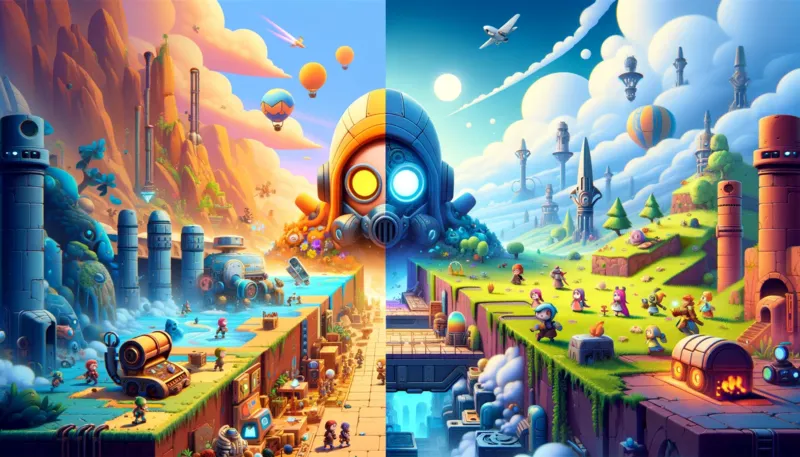Godot Engine vs Unreal Engine for 2D Game Development

Two significant players in this arena are Godot Engine and Unreal Engine. In this comprehensive guide, we'll dive into the strengths and weaknesses of both engines, particularly focusing on 2D game development. Our goal is to provide insights to help you decide which engine suits your project best.
Introduction to Godot and Unreal Engine
Godot Engine is a free, open-source game development platform known for its ease of use and strong support for 2D games. Its lightweight design and user-friendly interface make it a favorite among indie developers. Godot's scripting language, GDScript, is Python-like, easy to learn, and specifically tailored for the engine, offering a gentle learning curve for beginners.
On the other side, Unreal Engine, developed by Epic Games, is a powerhouse in the gaming industry, known for its high-fidelity graphics and robust capabilities in 3D game development. It supports C++ and Blueprints Visual Scripting, allowing developers with different programming backgrounds to effectively use the engine. While Unreal Engine is free to use, it operates on a royalty model, requiring a percentage of revenue after a certain threshold.
Godot’s Strengths in 2D Game Development
Godot shines in 2D game development. It possesses a dedicated 2D engine, which means its tools and features are specifically designed for 2D, providing more efficient and optimized performance for these types of games. Developers can leverage features like 2D lighting, shadows, materials, masking, and clipping. Its lightweight nature also ensures smoother performance on less powerful hardware, a crucial aspect for mobile game development.
Unreal Engine in 2D Game Development
Unreal Engine, predominantly recognized for 3D development, also offers 2D game development capabilities. However, it is not its primary focus. While Unreal Engine can be used for 2D games, the process can be more cumbersome compared to Godot, with less optimization for 2D-specific functionalities. Nonetheless, Unreal's Blueprints system is a powerful tool for visual scripting, making it accessible for beginners who prefer not to delve into complex programming.
Community and Support
Both Godot and Unreal have active communities. Godot, being open-source, benefits from a vast network of developers contributing to its development and a growing base of educational resources. On the other hand, Unreal Engine boasts a large community with substantial support and resources, including detailed documentation, tutorials, and a marketplace for assets.
Industry Presence and Job Opportunities
Unreal Engine has a significant presence in the professional gaming industry, used in many popular games and even beyond gaming, in film and virtual production. This extensive use in the industry translates to more job opportunities for developers proficient in Unreal Engine. Godot, being newer and more indie-focused, has a smaller footprint in the professional sphere but is gaining traction, especially among indie game developers.
Licensing and Cost
A crucial factor in engine selection is cost. Godot is completely free, with no strings attached, making it an attractive option for indie developers or those on a tight budget. Unreal Engine is free until a project earns $1 million in revenue, after which a 5% royalty fee applies. This model makes Unreal accessible for startups but can be a consideration for projects expected to generate significant revenue.
Learning Curve and Ease of Use
Godot's user-friendly interface and GDScript make it an excellent choice for beginners. The learning curve is relatively gentle, and the community provides ample learning resources. Unreal Engine, while more complex due to its advanced capabilities, also offers a friendly starting point through its Blueprints system, allowing developers to create games without extensive coding knowledge.
Versatility and Future-Proofing
While Godot is superb for 2D game development, Unreal Engine offers more versatility. Its capabilities in 3D, VR, and AR development mean that developers looking to expand beyond 2D games in the future may find more value in mastering Unreal Engine. The constant updates and industry-leading features of Unreal also offer a degree of future-proofing for developers' skill sets.
Final Thoughts
Choosing between Godot and Unreal Engine for 2D game development depends on various factors, including your project's specific needs, your experience level, and future goals. For pure 2D projects, especially for indie developers or those new to game development, Godot is an excellent choice. Its ease of use, dedicated 2D tools, and free cost make it highly accessible. However, for those looking for a more versatile engine with industry-leading features and are willing to navigate a steeper learning curve, Unreal Engine is the better choice.
Ultimately, both engines have their merits, and the decision should be based on your project's requirements and your long-term goals in game development. Whether you choose Godot for its dedicated 2D capabilities or Unreal for its versatility and industry dominance, both engines offer the tools and support needed to bring your game ideas to life.
